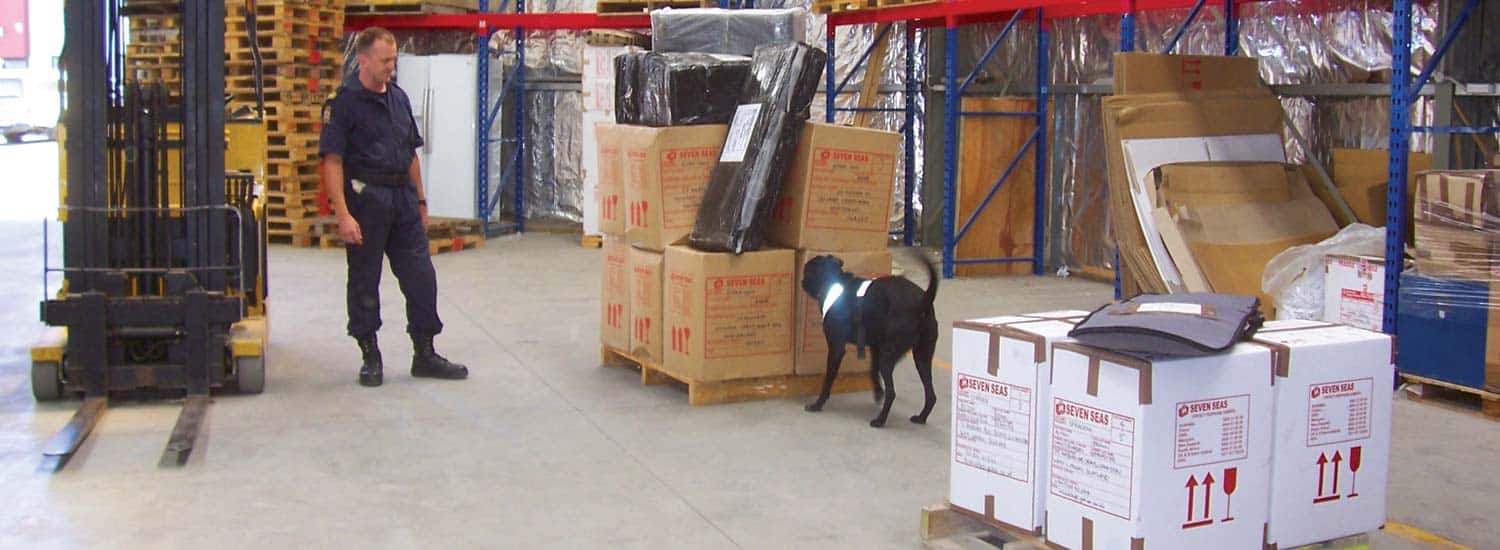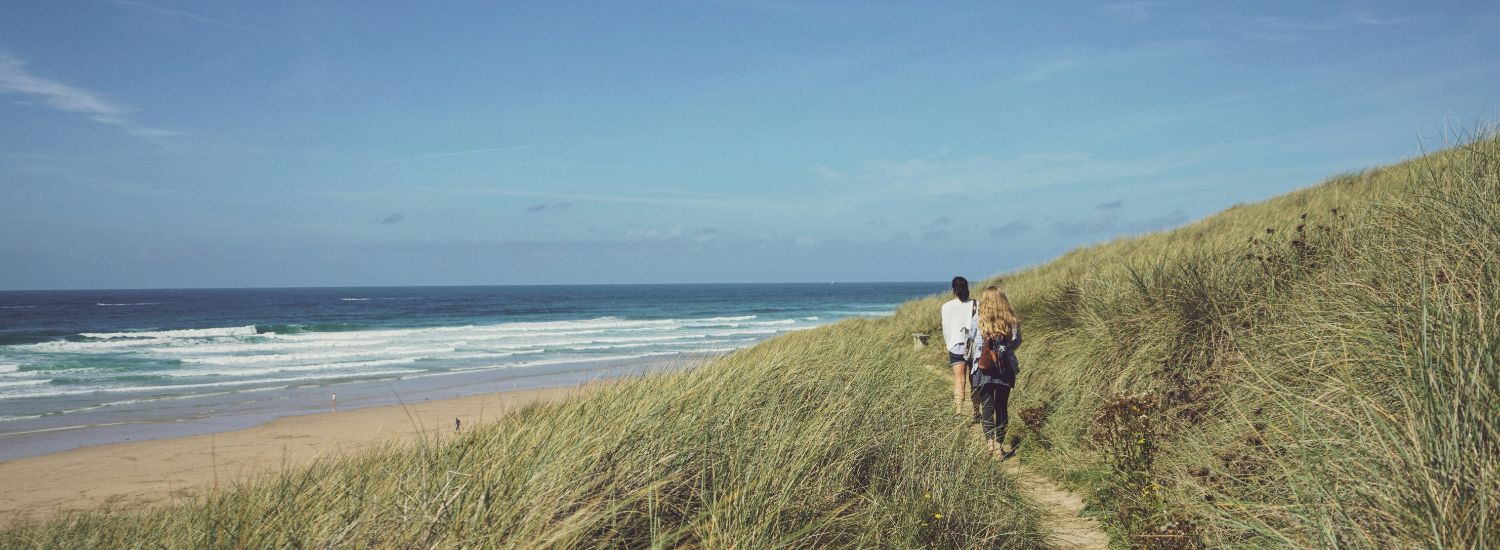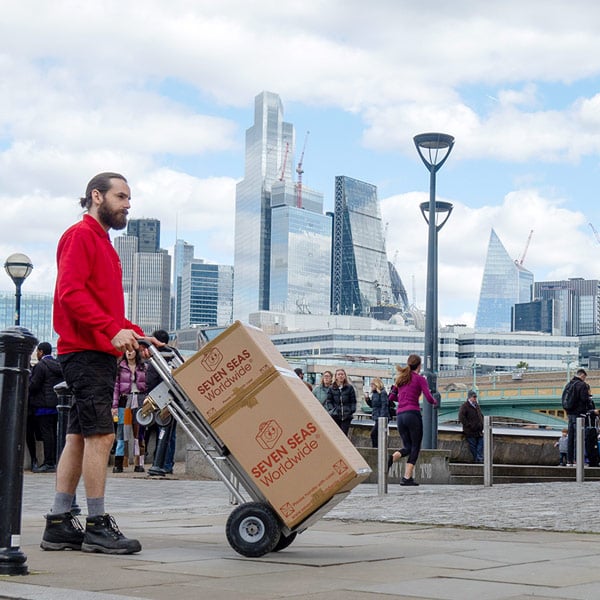Before packing, check this list of items prohibited from entering a particular country or region.

Table of contents
- Information about the UK
- Relocating pros and cons
- Applying for a visa
- UK visa costs
- UK living costs
- Best UK cities
- Renting vs. buying
- Opening a British bank account
- Getting a job in the UK
- British education system
- About healthcare
- Public transport in the UK
- British culture and history
- Shipping to UK
- Extra resources

What to know before moving to the UK
Moving to the UK is a dream come true for expats looking to soak up ancient history, stunning landscapes, and lively cultural options. From the rugged peaks of the Scottish Highlands to the bustling streets of London and Manchester, the United Kingdom offers endless opportunities!
Britain has experienced a surge in immigration numbers since the COVID-19 pandemic, from a low of 250,000 visas granted in 2020 to 526,000 in 2023 — more than double! Factors include a rise in overseas students and care workers.
This guide covers everything you need to know about relocating to the UK, including how to apply for a visa or permanent residency, job-searching tips, healthcare and education options, choosing where to settle and much more.
Is the UK a good place to live?
The UK is a good place to live thanks to having one of the world's most desirable living standards. Citizens enjoy free healthcare, a multicultural society and picturesque, varied landscapes. Plus, a strong economy, world-renowned universities, forward-thinking climate action, and a cutting-edge music, theatre and arts scene — wow!
Helpful information about living in the United Kingdom

Quick facts about the UK
| Countries | 4 |
| Overseas territories | 14 |
| Capitals | London (UK) — London (England), Edinburgh (Scotland), Cardiff (Wales) and Belfast (Northern Ireland) |
| Population | 67.59M |
| Official language | English (de facto) |
| Area | 94,354 mi² (244,376 km²) (78th largest in the world) |
| Currency | Pound sterling (GBP) (£) |
| Form of government | Unitary parliamentary constitutional monarchy |
| GDP (total) | $4 trillion (9th in the world) |
| GDP (per capita) | $58,880 (27th in the world) |
| Human Development Index (HDI) | 0.94 (15th in the world) |
| Time zone | GMT +0 |
(Sources: ons.gov.uk, imf.org, hdr.undp.org)
From the rugged peaks of the Scottish Highlands to the bustling streets of London and Manchester, the United Kingdom offers endless opportunities!
Map of the British Isles
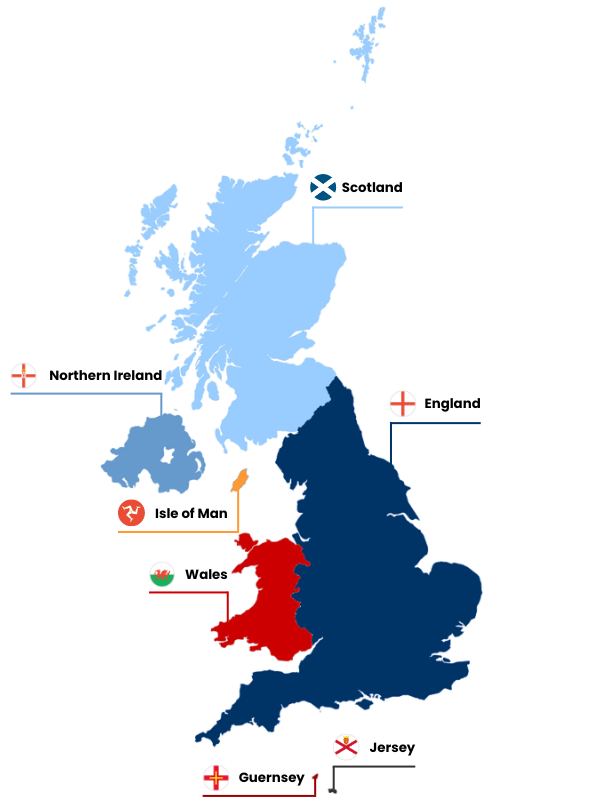

What are the pros and cons of emigrating to the UK?
The UK is an alluring destination packed with tradition, culture, and endless opportunities for those seeking a better quality of life. But nowhere is 100% perfect! So, here are some positives and negatives to consider before deciding on your big move.

Free healthcare:
Founded in 1945, the United Kingdom's National Health Service (NHS) provides free healthcare to all residents through taxation. Essential services, including doctor visits, hospital stays and surgeries, are accessible regardless of income.
History on your doorstep:
The UK attracted an estimated 37.8 million visitors in 2023, thanks to its numerous ancient monuments and buildings. From iconic landmarks like Big Ben and Buckingham Palace to Edinburgh Castle and Stonehenge, there's no shortage of fascinating history to explore.
Educational opportunities:
Britain has some of the world's oldest, most beautiful, and best-performing universities and colleges. Institutions like Oxford, Cambridge, and Imperial College London attract students worldwide seeking a quality education in scenic surroundings.
Access to nature:
Despite its many urbanised cities, the UK has plenty of access to nature and green spaces. From the rugged mountains of the Lake District to countless blooming botanical gardens, there are ample opportunities for outdoor recreation and relaxation around the country.

High cost of living:
Living in the UK, especially in expensive cities like London, Edinburgh and Oxford, can be costly. Housing, transport, and everyday expenses like food and energy prices can stretch your budget thin. Arguably, the high standard of living offsets costs.
Unpredictable weather:
If you're arriving from a warmer climate, the temperamental British weather might be challenging to adjust to! Winter, especially further north, can feel cold and long. However, the four-seasons-in-one-day vibe adds a unique charm to Britain's lush, green landscapes.
Costly education:
Tuition fees for international students are typically higher than those of UK residents. Non-UK residents can expect annual fees of between £10,000 and £26,000, with medical degrees costing upwards of £67,000.
Relations with the EU post-Brexit:
Since the UK departed from the European Union (EU) in January 2020, rules and regulations around trade and travel have changed significantly. As the UK is no longer part of the EU single market and customs union, starting your own business can be challenging due to increased customs checks and tariffs.
What countries are in the UK?
The countries in the UK are: England, Scotland, Wales, and Northern Ireland. Today's United Kingdom emerged gradually over several centuries via England's Norman Conquest, Wales's integration by 1542, the union with Scotland in 1707 and Northern Ireland's inclusion in 1921.

UK visas and immigration: everything you need to know
The United Kingdom is an ever-popular destination for expats looking to start afresh in a country with a high standard of living and plenty of opportunities. However, UK visas are highly sought after, and the application process can be complex. Your best chance of moving to the UK permanently is to have a desirable professional skill or be sponsored by a family member.
There are many types of UK visas, ranging from short stays to those lasting years.
How to move to the UK
To move to the UK, you must determine your eligibility and apply for the correct visa. Once approved, you'll need to pay the applicable fees, provide the requested identification and biometric data, and arrange a removals service. See below for more details.
Determine your eligibility and apply: research which immigration method you qualify for via the UK government's website, providing details such as your nationality, reason for moving and intended length of stay. Popular entry methods include the Skilled Worker visa, Health and Care Worker visa, Graduate visa and Family visa.
Pay your fees and gather your documents: pay your visa's specific charge and, if applicable, the immigration healthcare surcharge (IHS). Keep all your documents in one place, such as your passport, birth certificate, or marriage certificate, to take to a visa application centre or upload them via the UK Immigration: ID Check smartphone app.
Other documents you might need when filling in your application include:
- Educational certificates, e.g. degrees, diplomas or transcripts.
- Proof of work experience, e.g. a letter of employment or CV.
- Proof of language proficiency.
- Proof you can support yourself financially, e.g. bank statements.
Book an appointment: visit your local UK visa application centre to submit biometric data, such as fingerprints and a photograph.
Prepare for arrival: get ready for the exciting move by organising rental accommodation, registering at your local doctor's practice and opening a bank account.

UK visas: complete list
There are many types of UK visas, ranging from short stays to those lasting years. Eligibility depends on many factors, including nationality, country of residence, number of family members in the UK, refugee status, work intentions, study intentions, and more.
You can check which visas you're eligible for on the UK government website.
UK visa types include:
- Visitor visas: for short visits up to six months.
- Skilled Worker visas: for qualified individuals offered employment in an eligible occupation.
- Student visas: temporary and long-term stays for a defined length of time on a course of study in the UK.
- Family visas: to live with family members in the UK.
- Spouse/Fiancé/Partner visas: to join a partner in the UK who is a British citizen.
- Child visas: to join parents or legal guardians in the UK.
- Innovator Founder visas: for those looking to start or run an endorsed, original business in the UK.
- Ancestry visa: for individuals with a grandparent born in the UK, Channel Islands, or the Isle of Man.
- Asylum visa: to seek protection in the UK due to persecution or increased danger in your home country.
How to track UK visa application
To track a UK visa application, you can log into your UK Visas and Immigration (UKVI) online account. From there, you can update your details, view and prove your immigration status and check your application's progress. If you didn't apply online, call or email UKVI, but ensure you have your reference number to hand before getting in touch.

How long does it take to get a UK visa?
To get a UK visa takes between three and twenty-four weeks to process. However, as each application depends on personal circumstances like your current country of residency, visa subtype, staffing levels and demand, times vary. Processing time starts when you submit your supporting documents online or visit a visa application centre to prove your biometric data and ends with an email or letter notification.
Here are the processing times based on the current volume for common UK visa types:
| Visa | Time |
| Standard Visitor | 3 weeks |
| Marriage Visitor | 3 weeks |
| Student | 3 weeks |
| Child Student (4-17 years) | 3 weeks |
| Partner or Spouse | 24 weeks |
| Parent | 24 weeks |
| Child | 24 weeks |
| Skilled Worker | 3 weeks |
| Health and Care Worker | 3 weeks |
| Innovator Founder | 3 weeks |
Check the UK Government Services website to see if you need to apply for a visa before visiting the country.
UK visa application
All visitors need a valid passport before entering the United Kingdom. If arriving from certain countries, such as Schengen Area members, the US, Canada, Japan and Australia, you can reside in the UK for up to six months without a visa. However, you cannot undertake any work, including self-employment.
Check the UK Government Services website to see if you need to apply for a visa before visiting the country.
Common visas include:
Skilled Worker visa:
A Skilled Worker visa allows overseas residents to work for an approved employer in the UK for up to five years. After this, you can reapply multiple times if you still meet the eligibility requirements. After five years of continuous stay, you can apply for permanent residency, known as indefinite leave to remain.
You must apply online. Fees vary based on you and your family's circumstances. Skilled Worker visa holders can work, study, bring eligible dependents, volunteer and take on a second job.
Health and Care Worker visa:
A Health and Care Worker visa lets doctors, nurses, and other medical professionals from overseas work in the UK for the NHS, an NHS supplier, or adult social care. Health and Care Worker visas last up to five years, after which you can apply for an extension or indefinite leave to remain.
Student visa:
A Student visa allows successful applicants over 16 years old to study in the UK on a course sponsored by a licenced student sponsor. Depending on the course, you can stay in the country for up to five years. Once you complete the course, you can apply to continue your studies or switch to a Graduate visa, which gives you two years of additional stay.
Family visa:
A UK Family visa allows immigrants to reside with a spouse, partner, children, parents or relatives who require long-term care. Fees vary based on each individual's circumstances and whether you're applying from inside or outside the UK. You can reapply as often as you wish. Depending on your visa type, you may be eligible for indefinite leave to remain after two to five years.
UK visa requirements
Eligibility for UK visas depends on several factors, including the purpose of your stay, the country you arrive from and personal circumstances. Common types of visas include visitor visas, work visas, student visas, and family visas. Each visa category has specific eligibility requirements. It's essential you thoroughly research your visa type before submitting your application.
Skilled Worker visa requirements include:
- Sponsorship from a UK employer with a Certificate of Sponsorship (CoS) as proof.
- Having a job offer on the eligible occupations list.
- Meeting the minimum salary criteria, depending on your job.
- Proving your ability to read, speak, write and understand English.
Health and Care Worker visa eligibility includes:
- Sponsorship from a UK employer with a Certificate of Sponsorship (CoS) as proof.
- Being a fully qualified doctor, nurse, or social care professional.
- Meeting the minimum salary criteria, depending on your job.
- English language proficiency.
To apply for a Student visa, you must:
- Be 16 years or older. If you are under 18, you must provide evidence of your parents' consent.
- Have an offer from a licensed student sponsor.
- Pay application fees of £490.
- Have enough funds to support yourself and pay for your studies.
- Be able to speak, read, write and comprehend English.


How much does a UK visa cost?
The cost of a UK visa depends on several factors, including whether you are inside or outside the UK when applying, the length and purpose of your stay, premium services and more. Below are some of the most common application costs for UK visas*. However, check the UKVI website before applying, as prices are subject to change.
Please note that prices do not include additional fees based on personal circumstances, such as biometric enrolment and the healthcare surcharge.
![]()
Visitor visas
- Visitor in Transit visa: £64
- Up to 6 months: £115
- Up to 2 years: £400
- Up to 5 years: £771
- Up to 10 years: £963
![]()
Work visas
- Innovator Founder: £1,191
- Skilled Worker: £719 for 3 years or less/£1,420 over 3 years
- Skilled Worker in shortage occupation: £551 for 3 years or less/£1,084 over 3 years
- Skilled Worker – Health and Care Visa: £284 for 3 years or less/£551 over 3 years
![]()
Student visas
- Adult Student: £490
- Child Student (for children aged 4 and 17 years old): £490
- Short-term Student (over 6 months, less than 11 months): £200
Source: gov.uk
*prices accurate as of 2024
Can I retire in the UK?
You cannot retire in the UK if you're an expat as the country no longer has a retirement visa. However, you can apply for a working or family visa and then for indefinite leave to remain after a certain period, usually five years. You'll need at least ten years of qualifying work contributions to receive the UK state pension.
The United Kingdom's Skilled Worker visa allows immigrants to apply for employer sponsorship for a pre-approved role.

Youth Mobility Scheme: how to apply for a young person's visa
The Youth Mobility Scheme visa allows young adults aged 18 to 30 (35 in some cases) from specific countries to live and work in the UK for up to two years. If selected via ballot, eligible countries include Australia, Canada, Japan, Iceland, South Korea, Hong Kong and Taiwan.
You can leave and re-enter the UK as many times as you like. Applicants must prove they have at least £2,530 for 28 consecutive days after applying to support themselves in the UK. You cannot apply if you have children under 18 who live with you or depend on you financially or if you have previously lived in the UK under the Youth Mobility Scheme.
Check which documents you must provide based on your country of origin, including a tuberculosis test result in some regions, and then apply online.
There is a separate scheme for Indian nationals, the India Young Professionals Scheme visa.
Is there a UK visa lottery?
The UK does not have a visa lottery similar to the United States's Diversity Immigrant Visa Program, which allows applicants from certain countries to win a visa by random selection.
Instead, your best chance of securing a move to the UK is having desirable work experience. The United Kingdom's Skilled Worker visa allows immigrants to apply for employer sponsorship for a pre-approved role. Qualifying criteria include being 18 years or older, meeting the minimum salary threshold of £38,700*, and proving your English language ability.
*price accurate as of 2024
What percentage of the UK's population is immigrants?
Immigrants are
14% of the UK's population

UK citizenship: everything you need to know
Once you and your family have sampled life in the UK and want to stay, your next step is to apply for citizenship, sometimes known as "naturalisation".
For many, obtaining British citizenship is more than just a formality — it's about fully integrating with your new surroundings and connecting with your fellow Brits. Plus, you'll be able to vote, live, work, study, take up political office, apply for a passport, bring relatives or spouses, and leave the UK as often as you like.
For many, obtaining British citizenship is more than just a formality — it's about fully integrating with your new surroundings and connecting with your fellow Brits.
How to get British citizenship
The most common ways to get British citizenship are by birthright, marriage and civil partnerships, or applying for Indefinite Leave to Remain (ILR).
Below, we explore these various routes in more depth:
Birthright
Being born in the UK does not automatically grant you British citizenship. Factors include your parents' nationalities and when you were born. You can check the UK government website to see if you're a British Citizen and then apply for citizenship.
Marriage and civil partnerships
You can apply for citizenship when you marry or enter into a civil partnership with a British citizen if:
- You can prove you've lived in the UK for three years.
- You pass the life in the UK test.
- You can prove your knowledge of the English language.
- You've been granted Indefinite Leave to Remain (ILR) or settled status.
- You're 18 years or older.
Indefinite Leave to Remain (ILR)
You can apply for ILR after living in the UK for several years, usually five. Exceptions are Tier 1 visas (two or three years) and Innovator Founder and Global Talent visas (three years).
You can apply for citizenship once you've had ILR status for at least twelve months.
Other UK citizenship routes
- Having a British parent.
- Having settled status under the EU settlement scheme (the deadline was June 2021. However, you can still apply if you have "reasonable grounds" for missing the deadline).
- Having another type of British nationality, such as an overseas citizen or a British-protected person.
- Having a mother or father with British overseas territories citizenship.
UK citizenship requirements
The requirements to become a UK citizen depend on several factors, including individual circumstances and which method you're eligible for.
However, in general, requirements include:
- Residency: apart from a few exceptions, such as having a Tier 1 visa or marrying a British citizen, you must have lived in the UK for at least five years before applying for citizenship.
- Demonstrate good character: complete your application by answering all questions honestly and having no serious crimes or immigration offences in the past ten years.
- English language ability: unless exempt, you must have an English qualification at B1, B2, C1 or C2 level or complete a degree taught in the UK.
- Understand what it means to be British: to become a UK citizen, you must pass the Life in the UK Test — a multiple-choice questionnaire on Britain's history, politics, traditions, and more.
- Fee payments: application costs range from £130 to £1,630, depending on which method of citizenship you qualify for.

Life in the UK test: 5 practice questions
The Life in the UK Test is an online quiz consisting of twenty-four multiple-choice questions on the UK's laws, values, history and everyday life. You can prepare for it by studying the Life in the UK handbook.
You must achieve 75% or higher within the 45-minute time limit. Before starting, you'll need an email address, a credit or debit card to pay the £75* cost, and an accepted form of ID.
See how much you know about life in Great Britain and Northern Ireland with these practice questions:
1. Which of these is a famous classical music event in the UK?
a) T in the Park
b) Glastonbury Festival
c) Creamfields
d) The Proms
Answer: d
2. Which UK charity works to preserve important buildings?
a) The Red Cross
b) NSPCC
c) Age UK
d) The National Trust
Answer: d
3. Which flower is associated with England?
a) Thistle
b) Daffodil
c) Rose
d) Shamrock
Answer: c
4. Who was the first Briton to win the Olympic gold medal in the 10,000 metres?
a) Mo Farah
b) Chris Hoy
c) Bradley Wiggins
d) David Weir
Answer: a
5. Which TWO are British Overseas Territories (BOTs)?
a) The Falkland Islands
b) Hawaii
c) Ireland
d) St Helena
Answer: a and d
*price as of 2024
How hard is it to move to the UK?
Moving to the UK is not straightforward and depends on several factors, such as your birthplace, work experience, whether or not you have family in the UK and if you plan to work or study.
Another consideration is the best way to move your personal belongings overseas. The easiest method is to hire a professional international removals company that can provide a self-loading moving pod like the Seven Seas Worldwide MoveCube®.
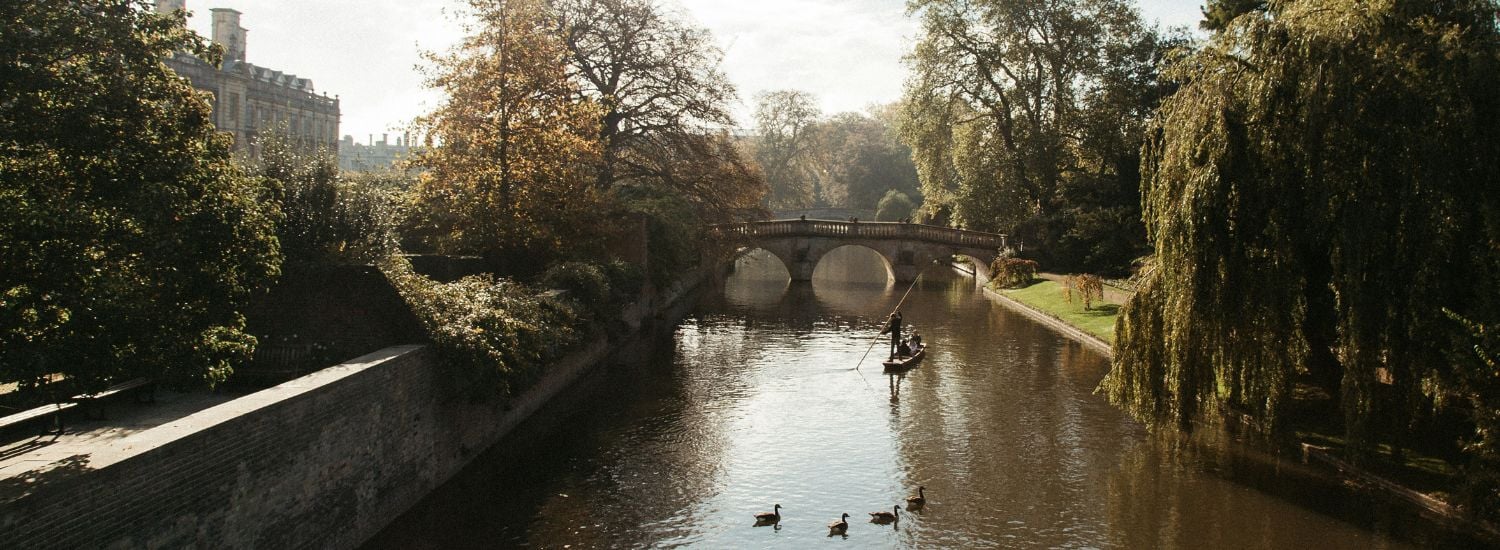
A helpful guide on the UK's cost of living
The cost of living in the UK varies significantly by region and city, so before you move, ensure you budget for accommodation, utilities, educational fees, transport and food. Housing costs, like rent or mortgage payments, are usually the highest expense, especially in popular cities like London, Cambridge, Bristol and Edinburgh.
However, the standard of living in the UK is high: the NHS covers most essential medical care, crime in England and Wales is at an all-time low, the economy is strong (with the 9th highest GDP in the world!), and unemployment is just 3.9%.
How much does moving to the UK cost?
The money needed to move to the UK depends on you and your family's circumstances. However, typical considerations include budgeting for visa application and appointment fees, flights, accommodation and overseas removal costs.
Here is some more information about potential costs to keep in mind:
Visa application costs:
Depending on which UK visa you qualify for, you'll need to consider application fees and the yearly healthcare surcharge — the exact amount depends on the length and type of your visa. Plus, there are costs to consider when visiting a visa application centre to confirm your identification and take your biometrics.
Flights:
The cost of flights to the UK depends on your country of origin, the time of year, and the airline. Save money by booking in advance using flight comparison websites like Flights Finder, Skyscanner, and Google Flights. Consider paying for an open return ticket so you can easily return home if settling in proves difficult.
Temporary accommodation:
Buying a property on arrival in the UK is a big commitment. Instead, consider renting first to acclimatise to your new surroundings comfortably. Popular property rental websites in the UK include Rightmove, Zoopla, and OnTheMarket.
Costs vary by city and the size and type of home. According to Rightmove, the cheapest city for a two-bedroom property is Carlisle, averaging £607 per month, while the most expensive city is London, at £2,264.
...the cheapest city for a two-bedroom property is Carlisle, averaging £607 per month, while the most expensive city is London, at £2,264.

How much money do you need in the bank to move to the UK?
The money you need in the bank to move to the UK depends on your immigration method. Expenses include flights, accommodation, visa fees, biometric fees, the healthcare surcharge, and enough money to support yourself until you secure a job.
...according to iSchool Connect, the average monthly cost of travel in the UK is £140.
Is it expensive to live in the UK?
While the cost of living varies depending on location, lifestyle, and family size, expenses in the UK are more substantial than in some other developed nations. However, the minimum wage is relatively high (£11.44 for those 21 and over), unemployment is just 3.9%, and many regions outside big cities like London and Oxford are considerably cheaper.
Before deciding, research the cities and towns you're interested in and create a budget based on your income and likely expenses. The official UK government website has a breakdown of available cost-of-living support, such as childcare, benefits and pensions.
- Council tax: this tax funds services provided by local authorities, such as schools, recycling and rubbish collection, libraries and the police. Rates vary by region, so research before moving. You may be eligible for a tax reduction or exemption if you are a student, a single occupant or receive benefits.
- Utilities and bills: use comparison websites like Compare the Market and Uswitch to research how much your energy bills, such as electricity, gas and water, will cost.
- Transportation: according to iSchool Connect, the average monthly cost of travel in the UK is £140. However, prices vary significantly by city. In general, using public transport is cheaper, more stress-free, environmentally friendly, and quicker than driving, so consider leaving your car at home.
- Meals and groceries: the worldwide cost of living database, Numbeo, estimates that a three-course meal for two in the UK costs £60.00, a McDonald's McMeal £7.00, and a can of Coca-Cola £1.73. For grocery shopping, a litre of milk and a loaf of white bread cost £2.88 in London, £2.39 in Cardiff, £2.66 in Belfast, and £2.58 in Edinburgh.
- Healthcare: the NHS is the UK's publicly funded healthcare system, offering a wide range of essential medical services to all. It's funded through taxation and provides care free at the point of use. However, certain services, such as eye care, prescriptions (England only) and dental, require payment.

Cost of living in the UK*
Below are average prices (GBP£) for some everyday items and entertainment options in the United Kingdom:
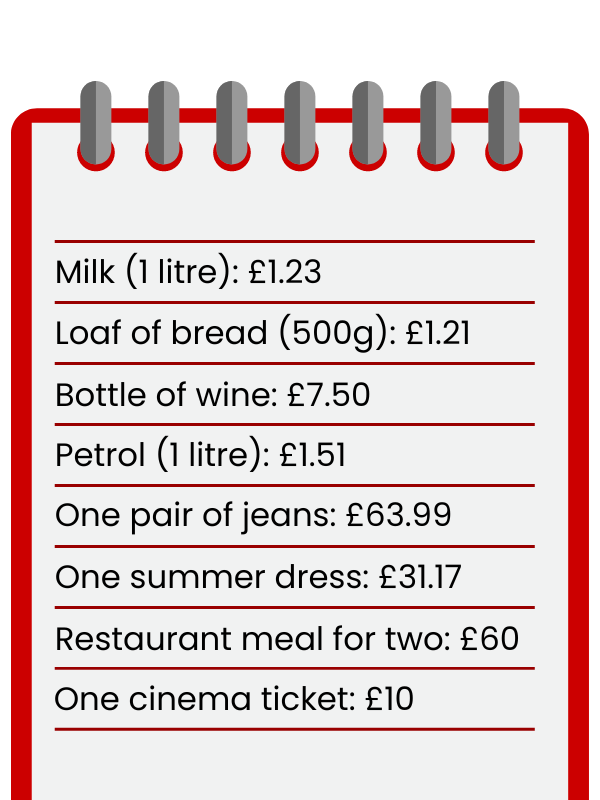
What is the minimum wage in the UK?
The minimum wage in the UK for adults over 21 is
£11.44 per hour
Source: gov.uk
*prices accurate as of 2024

Best places to live in the UK: 9 vibrant cities to call your new home!
The UK is a fascinating country full of vibrant, unique cities — often so distinct from one another that you'll hear completely different accents just a handful of miles away! Once your right of stay is approved, you can live anywhere from the culture-packed vibrancy of London to charming seaside towns and lively northern metropolises.
So, whether you care most about affordability, education or crime, we explore the UK's best cities for young people, retirees and coastal lovers.
Best places to live in the UK for young adults
The best places to live in the UK for young adults are London, Manchester and Bristol.
![]()
1. London
Thanks to iconic landmarks, endless opportunities and a buzzing nightlife, London is a top global destination for young expats. From bustling, cosmopolitan neighbourhoods to a thriving arts scene, the city pulsates with energy and excitement.
Graduates have excellent career prospects, particularly in technology, finance, and the creative and digital arts. While living costs are the highest in the UK, the city's vibrance and diversity make it an exhilarating choice for young professionals.
Population: 8.79M
Avg. monthly salary (after tax): £3,205
Avg. monthly rent (1-bed apartment): £2,238
Avg. house price: £508,000
Cost of living: 40% higher than the UK average for a family of four
Primary industries: finance, technology and consulting
Popular neighbourhoods: Shoreditch, Camberwell and Greenwich
Warmest month: July and August (avg. high 23°C, avg. low 15°C)
Coldest month: January (avg. high 9°C, avg. low 4°C)
The UK is a fascinating country full of vibrant, unique cities...

![]()
2. Manchester
Like London, Manchester is a prime destination for young adults thanks to its exciting cultural scene, diverse neighbourhoods and excellent career opportunities. Jobs are plentiful for graduates: from 2010 to 2020, the city's economy grew from £53.89 billion to £78.7 billion — a 39% increase!
However, the comparatively lower cost of living might give the northern city an edge over the capital. According to the cost of living database, Numbeo, eating out is 25.5% lower, rent is 107% lower, and a monthly transport pass is a whopping 150% lower!
Population: 549,853
Avg. monthly salary (after tax): £2,217
Avg. monthly rent (1-bed apartment): £1,170
Avg. house price: £254,000
Cost of living: 6% higher than the UK average for a family of four
Primary industries: manufacturing, marketing and healthcare
Popular neighbourhoods: Salford Quays, Castlefield and Ancoats
Warmest month: July (avg. high 20°C, avg. low 14°C)
Coldest month: January and February (avg. high 7°C, avg. low 3°C)
![]()
3. Bristol
Located in the southwest of England, Bristol is a city that is "alive with indie spirit," according to National Geographic. The port city is known for many things, including world-famous street artist Banksy, bands such as Massive Attack and Portishead, and its maritime history.
Respected higher education institutions include the University of Bristol, the University of the West of England and Bristol Old Vic Theatre School. A long-time favourite destination for young people, Bristol offers a dynamic and inclusive environment where students, artists, and professionals can pursue their ambitions.
Population: 472,500
Avg. monthly salary (after tax): £2,423
Avg. monthly rent (1-bed apartment): £1,369
Avg. house price: £339,000
Cost of living: 1% higher than the UK average for a family of four
Primary industries: manufacturing, marketing and healthcare
Popular neighbourhoods: Clifton, Horfield and Redland
Warmest month: July (avg. high 22°C, avg. low 14°C)
Coldest month: January and February (avg. high 8°C, avg. low 3°C)
Best places to retire in UK
The best places to retire in UK are Oxford, Swansea and York.
Sitting on South Wales's scenic coastline, Swansea provides retirees with a relaxed and picturesque setting...

![]()
1. Oxford
Thanks to historic architecture and picturesque countryside, Oxford offers retirees a tranquil and culturally satisfying environment. With its charming green spaces, beautiful streets and academic allure, the city exudes sophistication and elegance. Enjoy leisurely strolls along the River Thames, explore world-class museums and galleries, and sample endless gourmet food.
Despite its cosmopolitan atmosphere, Oxford maintains a sense of quiet, thanks to some of the lowest incidences of crime in the UK — an ideal destination for those seeking a peaceful retirement spot.
Population: 162,100
Avg. monthly salary (after tax): £2,440
Avg. monthly rent (1-bed apartment): £1,460
Avg. house price: £460,000
Cost of living: 11% higher than the UK average for a family of four
Primary industries: education, healthcare and technology
Popular neighbourhoods: Jericho, Summertown and Cowley
Warmest month: July (avg. high 23°C, avg. low 13°C)
Coldest month: December, January and February (avg. high 8°C, avg. low 2°C)
![]()
2. Swansea
Sitting on South Wales's scenic coastline, Swansea provides retirees with a relaxed and picturesque setting to enjoy their golden years. The city offers natural beauty and cultural highlights thanks to beautiful beaches, blooming parks and historic sites, such as poet Dylan Thomas's birthplace and Swansea Castle.
Recently voted the UK's 9th safest city, Swansea's welcoming community and low cost of living make it an attractive choice for those seeking a peaceful retirement.
Population: 246,217
Avg. monthly salary (after tax): £1,869
Avg. monthly rent (1-bed apartment): £862
Avg. house price: £193,000
Cost of living: 1% higher than the UK average for a family of four
Primary industries: education, maritime and IT
Popular neighbourhoods: the Mumbles, Parkmill and Uplands
Warmest month: July (avg. high 19°C, avg. low 14°C)
Coldest month: January and February (avg. high 8°C, avg. low 4°C)
![]()
3. York
Retirees flock to the heart of Yorkshire for its warm sense of community spirit and picturesque setting. The walled ancient city boasts mediaeval architecture, cobbled streets and scenic riverside walks. Explore historic landmarks like York Minster, meander through quaint boutique shops, and enjoy slow-paced boat rides along the River Ouse.
Plus, York ranks lower than the average for England and Wales for various crimes, including burglary, drug offences, theft, and disorderly conduct.
Population: 141,685
Avg. monthly salary (after tax): £2,881
Avg. monthly rent (1-bed apartment): £850
Avg. house price: £303,000
Cost of living: 1% lower than the UK average for a family of four
Primary industries: tourism, education and retail
Popular neighbourhoods: Micklegate, Badger Hill and Heworth
Warmest month: July (avg. high 21°C, avg. low 12°C)
Coldest month: December, January and February (avg. high 7°C, avg. low 1°C)
Best seaside towns to live UK
The best seaside towns to live UK are Portsmouth, Brighton and Cardiff.
![]()
1. Portsmouth
Portsmouth is a seaside treasure packed with maritime heritage and coastal charm. Thanks to its historic dockyards, lively harbour and 360° views of the Solent, the city draws expats from all over the world.
Enjoy fresh seafood at waterfront restaurants, explore 18th-century warships and museums and take leisurely promenade strolls.
According to Numbeo, Portsmouth residents rate the following crimes and worries as "low": corruption and bribery, assault, muggings and car theft.
Population: 208,100
Avg. monthly salary (after tax): £2,353
Avg. monthly rent (1-bed apartment): £904
Avg. house price: £253,000
Cost of living: 1% higher than the UK average for a family of four
Primary industries: maritime, manufacturing and tourism
Popular neighbourhoods: Southsea, Cosham and Hilsea
Warmest month: July and August (avg. high 21°C, avg. low 14°C)
Coldest month: January (avg. high 8°C, avg. low 4°C)
The Welsh capital, Cardiff, offers expats an alluring blend of seaside comforts and big-city living.

![]()
2. Brighton
Brighton is a unique destination for expats thanks to its throwback seaside charm and lively cosmopolitan atmosphere. The city exudes playfulness with its iconic pebble beach, the historic Brighton Pier, and bustling promenade.
Residents can enjoy an eclectic culinary scene, including excellent choices for veggies and vegans, colourful arts festivals, and a thriving LGBTQ+ community.
Brightonites report the following crimes and worries as "low" via Numbeo: robbery, muggings, car theft and violent crime.
Population: 276,334
Avg. monthly salary (after tax): £2,394
Avg. monthly rent (1-bed apartment): £1,412
Avg. house price: £427,000
Cost of living: 10% higher than the UK average for a family of four
Primary industries: tourism, marketing and education
Popular neighbourhoods: Hove, Kemptown and Seven Dials
Warmest month: July and August (avg. high 20°C, avg. low 15°C)
Coldest month: February (avg. high 6°C, avg. low 3°C)
![]()
3. Cardiff
The Welsh capital, Cardiff, offers expats an alluring blend of seaside comforts and big-city living. With its scenic bay and cute waterfront cafes, the city exudes chilled-out coastal charm. Plus, its diverse cultural scene, exciting nightlife, and approachable community make it a welcoming destination for expats.
Explore historic landmarks like Cardiff Castle, enjoy fresh seafood at harborside eateries, and soak up the sun while relaxing on the beach.
Cardiff residents rate being mugged, car theft, robbery, corruption and bribery as a "low" problem/ or worry on Numbeo.
Population: 359,512
Avg. monthly salary (after tax): £2,190
Avg. monthly rent (1-bed apartment): £1,021
Avg. house price: £216,730
Cost of living: 3% lower than the UK average for a family of four
Primary industries: finance, media and education
Popular neighbourhoods: Roath, Cardiff Bay and Pontcanna
Warmest month: July and August (avg. high 22°C, avg. low 14°C)
Coldest month: January (avg. high 8°C, avg. low 4°C)
Sources: ons.gov.uk, statista.com, numbeo.com
Cheapest place to live in UK
According to a recent study by property website Zoopla, Cumnock in Scotland is the cheapest place to live in the UK, with a median property value of £79,030. Scotland dominated the results, with a whopping eight entries in the top ten. In contrast, Croydon is the most affordable place to live in London, with an average property price of £415,200.

6 top London attractions

Biggest cities in UK
The United Kingdom boasts many large cities, each with its own unique character, accent, history and culture.
Following the 2021 UK census, the Office for National Statistics determines the following five cities as the most populous:
- London (8.78M)
- Birmingham (1.12M)
- Glasgow (635,200)
- Leeds (516,298)
- Liverpool (496,784)
Best places to live in London
Notting Hill, Hackney and Richmond are often considered the best places to live in London. The UK's capital is an exciting place to live, especially for young adults, thanks to world-class culture, iconic landmarks and unbeatable dining and entertainment options.
- Notting Hill: famous for its tree-lined streets, colourful houses and the annual Notting Hill Carnival. Enjoy quaint cafes, quirky markets, upscale restaurants and a lively, cosmopolitan atmosphere.
- Hackney: a relatively affordable London borough full of creativity and diversity. Its eclectic mix of cultures, street art and green spaces makes it popular with students, young professionals and families.
- Richmond: South London's picturesque suburb radiates elegance thanks to lush parks, riverside promenades, charming boutiques and gourmet dining — a haven away from the hustle and bustle of the city.
What is the crime rate in the UK?
Crime rates in the UK vary depending on the type of crime and region. According to crowd-sourced online database Numbeo, the top five cities with the highest overall crime rates are:
- Bradford
- Coventry
- Birmingham
- Manchester
- London
The top five safest UK cities are:
- Nottingham
- Edinburgh
- Cardiff
- Newport
- Swansea
However, compared to many developed countries, crime is low. The UK ranks 63rd in the world overall with a Numbeo Crime Index score of 47.4, beating Sweden (60th), Belgium (59th), the US (58th) and France (37th).
What is the safest city in the UK?
Nottingham is the safest city in the UK, according to a recent study by Molo Finance on the safest places to live in England and Wales, based on a number of metrics, including robberies, theft, and burglaries per 100,000 people.
The top five included three Welsh cities: Newport, Swansea, and Cardiff, while recorded crime and offences data released by the Scottish government in 2023 revealed the Orkney Islands, East Renfrewshire and East Dunbartonshire to be the safest areas in Scotland. With just 0.93 burglaries per 100,000 residents, Mid Ulster topped the safest Northern Irish region for families in a 2022 study by confused.com.
Nottingham is the safest city in the UK, according to a recent study by Molo Finance...

UK property prices*: most and least expensive regions
London
£528,798 avg. house value
North East England
£168,274 avg. house value
Source: Average resale house prices in Canada
*prices accurate as of 2024
How many people live in the UK?
The number of people that live in the UK is an estimated 67,596,281, divided between England, Scotland, Wales, and Northern Ireland, according to the Office for National Statistics' 2021/2022 census.
England is the most populous country, with over 56 million residents. Significant concentrations live in large cities like London, Birmingham, Manchester and Glasgow. Some more sparsely populated areas include the Scottish Highlands, Welsh Valleys and the Northern Irish countryside.

Renting vs. buying a home in the UK
Once you've picked a UK town or city to move to, the next step is deciding whether to buy or rent. Renting offers an excellent opportunity to adapt to your new surroundings before committing to buying a home. Plus, it allows the flexibility to return home if you discover that the UK isn't for you. Alternatively, buying lets you make an investment and build roots immediately.
Remember to book temporary accommodation at a local bed and breakfast (B&B), hotel or Airbnb on arrival, so you have somewhere to live while viewing homes!
![]()
What documents do you need to rent a home in the UK?
Typical documents your potential landlord or letting agent may request include:
- Identification: you'll need to prove your ability to live and work in the UK with copies of your passport, residence permit/visa (showing your biometrics) or university acceptance letter.
- Employment verification: a confirmation letter from your employer clearly stating your job title, start date, duration and salary.
- Proof of income: typically your three most recent months of bank statements or a P60.
- Landlord reference: a letter from your current or former landlord/letting agency detailing the condition in which you left the property and whether you paid on time and respected the lease rules.
- Character/personal reference: as an immigrant, you may also need a reference from a professional such as a lecturer or lawyer. They must have known you for at least two years and not be a relative.
- Credit report: with your permission, your landlord may perform a credit check to see if you have always paid on time, have any outstanding debts, or have ever been bankrupt.
Viewing in person offers a better feel of the layout and an opportunity to ask the letting agent for extra information.
Renting property in the UK
Research your chosen UK region online while still in your home country. Consider rental costs, proximity to work, public transport, cycle routes, schools, crime rates and local amenities, such as shopping malls, cinemas and gyms. Popular letting websites like Rightmove and Zoopla are excellent resources, while OpenRent lets you deal directly with landlords.
Avoid choosing a home based purely on images, video, and text. Viewing in person offers a better feel of the layout and an opportunity to ask the letting agent for extra information.
Top tip: if you like a property, don't hesitate to make an offer! Competition is fierce throughout the country, so the sooner you let your potential landlord know you're interested, the better.
After choosing a property, you must prove your identity, your right to live and work/study in the UK, and your ability to meet your rental payments. As a newcomer, you might lack a few documents. In this case, your landlord may request a few months' rent in advance or ask you to provide a local guarantor.
Once your documents are accepted, thoroughly read the lease. It details the rent you'll pay, the duration of your stay, the landlord's rules on pets, subletting, guests, smoking, ending the lease and more. Next, you'll sign two copies — one for you and one for your landlord. Then, pay the first month's rent and a deposit, usually equal to one month's rent.
Your landlord must place your deposit in a government-approved deposit scheme by law. Once all payments are complete, your landlord will give you a receipt for the deposit and first month's rent and hand over the keys to your new home.
Process of buying a house in the UK
Create a budget spreadsheet to determine if you can afford a mortgage. You'll need a deposit of at least 5% of your desired property's sell price, although 10% or more is typical. Then, register on credit score sites like Credit Karma and ClearScore to understand your likelihood of securing a mortgage and see score improvement tips.
Next, apply for a mortgage agreement in principle (AIP)mortgage agreement in principle (AIP) from a few banks. Trusted institutions include HSBC, Lloyds and Barclays. The bank will assess your current finances, including:
- Your household income
- Your credit history
- Your age
- All financial commitments and dependents
- Your desired mortgage
- Any debts you may have
Please note that if offered an AIP, it's not a mortgage guarantee.
View as many properties as possible via popular sites like Rightmove and Zoopla, and ask the estate agent as many questions as possible. Then, place an offer. If it is accepted, hire a solicitor and a surveyor to assess the property for damage and give you an evaluation.
Next, contact a mortgage broker who can guide you through the
mortgage application and secure favourable rates.
Once your application is in place, your bank will submit all necessary paperwork to your solicitor for review and prepare legal purchase documents. Ensure your budget includes enough to cover your lawyer's fees, survey fees and any other legal and inspection fees, such as Stamp Duty.

Opening a bank account in the UK for non-residents
To open a British bank account as an expat, first visit a few local branches and do some online research. The four biggest banks in the UK are HSBC, Lloyds, Natwest Group (including Royal Bank of Scotland Group) and Barclays.
The following are examples of common British bank accounts:
Current account: for day-to-day banking, including receiving wages, setting up direct debits for bills like utilities and subscriptions, and everyday spending. Most current accounts do not charge monthly fees and do not pay interest on money held, although there are exceptions.
Savings account: to set aside money for use at a later date while earning interest. Options include instant access accounts that you can dip in and out of and fixed-term accounts for 1 to 5 years that typically earn a higher interest rate.
Individual Savings Accounts (ISAs): tax-free savings with a limit of £20,000 per year. ISA types include Cash ISAs, Investment ISAs and Lifetime ISAs (to help save for your first home or retirement).
Non-citizens can open a bank account in the UK, but they must apply from within the country and provide identification. Required documents vary between banks but include a passport, visa, residence permit, biometric card, proof of right to work/study in the UK, and proof of address in the form of a utility bill or bank statement.

Ways to transfer money to a UK bank account
Here are several methods to transfer your overseas funds into your newly opened British bank account:
- Bank/money transfer: a wire transfer from your overseas bank to a UK bank. You must give your UK bank the SWIFT/BIC code and any other required information, such as your International Bank Account Number (IBAN). The process is secure; however, it could be more costly than alternative transfer options and will take a few days to complete.
- Online money transfer: international money platforms like Wise, PayPal, and Revolut let you send funds online using their app or website at cheaper fees than traditional banks.
- International bank draft: a physical cheque issued between overseas and UK banks. Perfect for those who feel less comfortable with online transfers. It may take longer to process but is usually less expensive.

Transferring savings to the UK
When moving to the UK, there are a few considerations regarding transferring your online savings. Here are your options:
Keep your account: if your savings are with a global banking group, you can continue using them from the UK. Contact your bank as soon as possible, as restrictions and charges may apply.
Transfer to a British bank: consider moving your funds to a UK bank with attractive features, such as low fees and plenty of street branches. Then, initiate an international money transfer between your banks or an online transfer with a global money service like Wise.
Close your account: if keeping the account open or transferring your savings to a British bank is not possible, you can close it before relocating. Remember to remove all remaining funds and consider applicable account closing fees.

Working and getting a job in the UK
With over nine hundred thousand vacancies across the UK, expats have many opportunities to secure a job. Your best chance of success is to apply for a Skilled Worker visa in a role sponsored by an approved employer. It's a points-based system, with importance given to in-demand jobs, high salaries, a PhD in a STEM profession and more.
Alternative options include temporary work visas, working student visas and the Youth Mobility Scheme.
Job hunting in the United Kingdom
Understanding your visa's working conditions is essential before starting your job search. For example, there may be a limit to the number of hours per week you can work or a defined end date.
Next, research employers and industries in the UK where your skills and education best fit. You can explore a list of eligible occupations for the Skilled Worker visa and their relevant job codes on the UK Visas and Immigration website.
Then, create a few CVs that reflect different aspects of your skills. For example, one version might emphasise your technical know-how when applying for an IT job, and in another, your organised and friendly manner for a customer-facing role.
Utilise job-search websites like Indeed, Monster, and Glassdoor and connect directly with potential employers and recruiters on LinkedIn, a platform designed for professionals.
The publicly funded National Careers Service is a valuable resource for information and help on everything related to work. Resources include skills assessments, face-to-face support, and job, education, and training advice.
Here are some further job-searching tips:
- Attend networking events and job fairs in your field of work to make lasting connections.
- Consider asking a professional CV writing service to spruce up your resume to help it stand out.
- Improve your skills by volunteering or taking up an internship related to your field.
- Go to your desired employer's website to check for vacancies. If there are none, show initiative by emailing them anyway — you never know!
- If English isn't your first language, consider taking lessons to enhance your job prospects.
- With each application, include a thoughtful cover letter highlighting your abilities and desire to work for that specific company.
- Before your interview, learn everything you can about your potential employer. Start with their "about us" page, social media accounts, and customer/employee reviews.
Finally, remember that getting a job as an expat in a competitive market requires persistence. Keep making connections and applying for everything related to your experience — you'll land your dream job soon enough!
What is the average salary in the UK?
The average salary in the UK is £34,963, which varies across regions. Areas with above-average salaries include London (£44,370), the South East (£36,560), and Scotland (£35,518).
Conversely, regions with lower-than-average wages include the North East (£31,200), East Midlands (£31,634) and Yorkshire and the Humber (£31,920).

UK employment statistics
| Avg. weekly working hours | 36.9 |
| Avg. annual income | £34,963 |
| Full-time employed | 24.76M |
| Part-time employed | 8.22M |
| Vacancies | 916,000 |
Sources: ons.gov.uk, parliment.uk
Most in-demand jobs UK
The most in-demand jobs in UK are web developers, software engineers, cybersecurity specialists, English teachers, high school teachers, insurance consultants, accountants, financial analysts, customer service representatives, sales assistants, nurses, and midwives, according to Indeed.
The graph below displays these roles by their expected average earnings in GBP£ and their corresponding Standard Occupational Classification (SOC), known as an occupation code*.
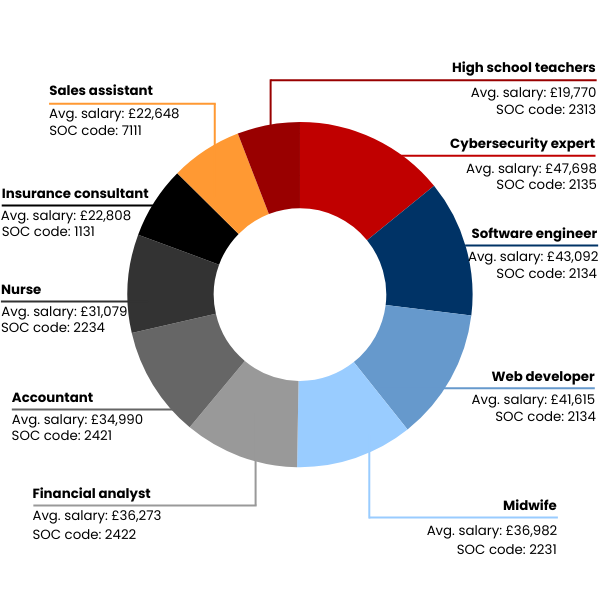
*The occupation code categorises every job in the UK labour market, which you'll need when applying for a working visa.
National Insurance (NI) in the UK is a social security contribution system in addition to income tax.

What is national insurance tax?
National Insurance (NI) tax in the UK is a social security contribution system in addition to income tax. Payments are automatically deducted from employees' earnings, with rates varying based on income:
| Weekly earnings | NI contribution (2024/25) |
| £0 to £242 | 0% |
| £242.01 to £967 | 8% |
| £967+ | 2% |
Both employees and employers contribute, including self-employed workers. NI is compulsory until you hit the state retirement age, which is currently 66 for both men and women.
What does national insurance pay for?
National Insurance pays for the National Health Service (NHS) and the state pension. It also helps pay for maternity allowance, bereavement support and some unemployment benefits, ensuring a safety net in times of need.
How much annual leave do you get in the UK?
UK employees are entitled to at least twenty-eight days of paid annual leave, including bank holidays. However, many employers offer additional holidays as part of their benefits package, often rising with time served, plus the option to take unpaid leave.
What is a bank holiday?
A bank holiday in the UK is a public day of rest during which banks and many businesses are closed. The government sets these holidays, which typically include New Year's Day, Easter Monday, May Day, Christmas Day, and Boxing Day. There are slight differences between bank holidays in England and Wales, Scotland, and Northern Ireland.
Young adults study specialised subjects working towards their GCSEs and A-levels in England...

UK school system: a complete overview
Education in the UK differs from country to country. Children must attend school between the ages of five and sixteen, either in a school setting (including private institutions) or homeschooling. In England, education is compulsory up to age eighteen — from age sixteen, it may include work-based apprenticeships, training and academic pursuits. Each nation manages its own curriculum, teacher training and funding.
You can find and apply to local schools by searching for your city or town's council website or using the official government website.
Required enrolment documents include:
- Your child's birth certificate or passport
- Proof of address
- Proof of guardianship
- Proof of residency
- Emergency contact information
- Record of immunisations
The education system in the United Kingdom is different in each country, but broadly includes:
Nursery (ages 3-5): optional, although most children attend some form of preschool to develop their learning, physical, and social skills, preparing them for primary school.
Primary school (ages 5-11): compulsory education that covers a diverse range of subjects including English, maths, science and physical education.
Secondary school (ages 11-16): compulsory for at least four years. Young adults study specialised subjects working towards their GCSEs and A-levels in England, and their equivalent in the rest of the UK, in preparation for higher education.
Understanding higher education in the UK
With 48.5% of the British workforce educated to a degree level or higher and school leavers achieving higher grades than ever, competition for the best jobs is tough. Admission to higher education varies by institution and depends on academic qualifications like A-levels and relevant work experience or qualifications for mature students.
Here are some examples of tertiary education and qualifications for British students:
College: undergraduate programs covering a range of disciplines, frequently incorporating practical, hands-on experience. Qualifications range from certificates and diplomas to applied degrees, often designed to progress onto university.
University: undergraduate and postgraduate programs that promote a high standard of research, academic theory and examinations. Bachelor's degrees usually last three to four years, master's degrees one or two years and doctoral degrees take three or more years.
According to the Department for Education Official Statistics, 87.3% of graduates in England are employed, with a median average salary of £38,500, which is £8,000 more than non-graduates.

Best universities in UK: 4 highest-rated institutions
The best universities in UK are the University of Oxford, University of Cambridge, Imperial College London and University College London, according to respected worldwide education data provider Times Higher Education.
Here is a breakdown of some of their highlights:

University of Oxford, Oxford
World ranking: 1 | Founded: 1096 | Full time students: 21,750 | International students: 42%
The University of Oxford is the oldest English-speaking university in the world. It is considered an example of academic brilliance. From cobblestone streets and mediaeval Gothic buildings to modern research facilities, the highly respected institution offers a unique environment for learning.
Students are encouraged to innovate, guided by rigorous curiosity, and forge lifelong connections to shape their future.
Oxford University's illustrious and varied alumni include writers Will Self and Alan Bennett, satirist Ian Hislop, actor Emily Mortimer, and composer Andrew Lloyd Webber.

University of Cambridge, Cambridge
World ranking: 5 | Founded: 1209 | Full time students: 20,565 | International students: 38%
The University of Cambridge is world-renowned for its celebrated alums, rivalry with Oxford University (collectively known as "Oxbridge"!) and high educational standards.
From the pointed arches and stone carvings of its Gothic architecture to the state-of-the-art research centres, the university offers students a unique and privileged learning environment.
Cambridge's many celebrated former students include several British prime ministers, writer Zadie Smith, comedian and actor Stephen Fry, illustrator Quentin Blake, and naturalist Charles Darwin.

Imperial College London, London
World ranking: 8 | Founded: 1907 | Full time students: 20,275 | International students: 61%
Imperial College London (ICL) is celebrated globally for its innovative research and rigorous academic standards. The university's programs mainly focus on science, engineering, medicine and business.
Initiatives like the Imperial College Enterprise Lab encourage student startups and spin-off companies. The university's close ties with industry leaders provide students and researchers valuable opportunities to make a real-world impact.
Notable Imperial alums include musician Brian May, author of "War of the Worlds" H.G. Wells, inventor James Dyson, and pharmacologist Alexander Fleming, who discovered penicillin.

University College London, London
World ranking: 22 | Founded: 1826 | Full time students: 41,110 | International students: 61%
University College London (UCL) is a public research university in Central London. Recognised worldwide for its pioneering research impact, UCL was one of the first institutions in London to admit students regardless of their social background or religion.
The university offers diverse programs across various disciplines, including arts and humanities, social sciences and engineering.
UCL's best-known alums span many disciplines, including astrophysicist Bruce Woodgate, known for his pioneering work on the Hubble Telescope, telephone inventor Alexander Graham Bell, actor Emma Thompson and author George Orwell.
Does the UK have free healthcare?
The UK provides mostly free healthcare services for residents. The National Health Service (NHS) is funded via National Insurance payments, ensuring essential care, such as doctor visits and hospital stays, are available without charge at the point of service.

UK healthcare: all you need to know
Thanks to free healthcare for all, the UK boasts one of the best life expectancies in the world, at 82.31 years. The NHS (National Health Service) is one of the world's first publicly funded healthcare systems, giving all British residents access to crucial medical services, including emergency care, ambulance journeys and surgeries.
However, some expenses, such as prescription medications (England only) and eye and dental care, are not included. The UK also has comprehensive private healthcare options for those willing to pay for extended doctor visits, increased choice, shorter surgery wait times and reduced prescription charges.

How many people work for the NHS?
1.7 million people work for the NHS (including both full and part-time staff) as of 2024, and employee costs account for around two-thirds of the organisation's expenditure. Roles include everything from doctors and nurses to housekeepers and grounds staff.
The NHS is the UK's biggest employer and one of the largest employers globally by headcount. Here are the world's top eight companies with the most personnel:

Source: www.statista.com
Private healthcare in the UK
Private healthcare in the UK is a small but growing sector. It's commonly offered as an employment benefit, usually by larger companies, and supplements services not covered for free by the NHS, such as prescriptions, dental and eye care, and alternative therapies like acupuncture.
The main attraction of "going private" is increased options, such as skipping NHS waiting lists, choosing your doctor, and accessing individual hospital rooms and treatments the NHS doesn't cover.
Private healthcare insurance is paid monthly or in annual instalments (or via your employer), known as "premiums". It covers individuals, couples, or entire families, from basic to comprehensive levels, depending on your budget. Once your policy starts, only new medical conditions are covered.
Each level provides a different extent of medical services and benefits. Basic plans may cover essential services like consultations and diagnostics, while higher levels offer access to private hospitals, specialist consultations and more extensive, long-term treatments.
How much is private healthcare UK?
The cost of private health insurance in the UK depends on your age, location, pre-existing health conditions and desired level of coverage.
According to insurance brokers IamINSURED, the average monthly premiums for private health insurance in 2024 are approximately £41.58 for individuals, £77.42 for couples and £95.19 for a family of four.
How much does the UK spend on healthcare?
The UK spends £280.7 billion per year on healthcare, according to the latest the Office of National Statistics figures, accounting for 12.4% of the country's GDP, or £4,188 per resident.

Public transport in the UK: the full rundown
The UK is a relatively small country, at just 601 miles long from end to end. The distance between London in the south and Edinburgh in the north is approximately 8 hours by car, a 1 hour and 10-minute flight, or 4 days (with sleep) by bike!
However, it boasts a vast, connected transport network linking all countries, cities and regions. With tens of billions invested in the High Speed 2 (HS2) rail project and ambitious plans for more cycle paths, the UK's public transport will be bigger, faster and more eco-friendly than ever.
Getting around in the UK
Getting around in the UK varies between cities and towns. Major cities like London, Liverpool, and Glasgow have extensive transit options, including subways, trams, buses, and trains, for convenient and affordable inner-city and suburban travel.
Here are some common transport methods across Britain:
Train:
The UK has an extensive rail network connecting all major cities and most towns, with high-speed services significantly reducing travel times. Network Rail maintains its infrastructure, while various operating companies, such as Scotrail and Avanti West Coast, manage passenger services. Most long-distance trains feature modern amenities, including onboard food and drink, Wi-Fi, and first-class options. Tickets can be bought online, via apps, or at train stations, and discounts are available for students, young people, and pensioners.
Bus:
Buses are an affordable but slower option for short and long-distance journeys across the UK, linking cities, towns and rural locations. Companies such as National Express and Megabus run the UK's bus network. Tickets can be purchased online, in-app, by phone or in person at bus stations. For shorter journeys, tickets can be bought on the bus with cash, card, or contactless.
Air:
Domestic air travel within the UK is less common due to the short distances, long wait times and high levels of CO2 it produces. However, major airports like Heathrow, Gatwick, and Manchester facilitate flights within the UK and internationally. Thanks to increased competition, airlines like EasyJet and Ryanair offer affordable domestic and international flights. You don't need a passport to fly within the UK, but you must show a valid photo ID.
Ferry:
Coastal areas in the UK, such as the Outer Hebrides and the Isle of Wight, rely on ferries to transport passengers and vehicles between islands and the mainland. Operators include Caledonian MacBrayne (CalMac), P&O Ferries and Irish Ferries. You can purchase tickets in advance online, at ferry terminals or onboard the vessels. Prices vary depending on the route, vessel type and passenger category.
The UK is a relatively small country, at just 601 miles long from end to end.

How do people get to work in the UK?
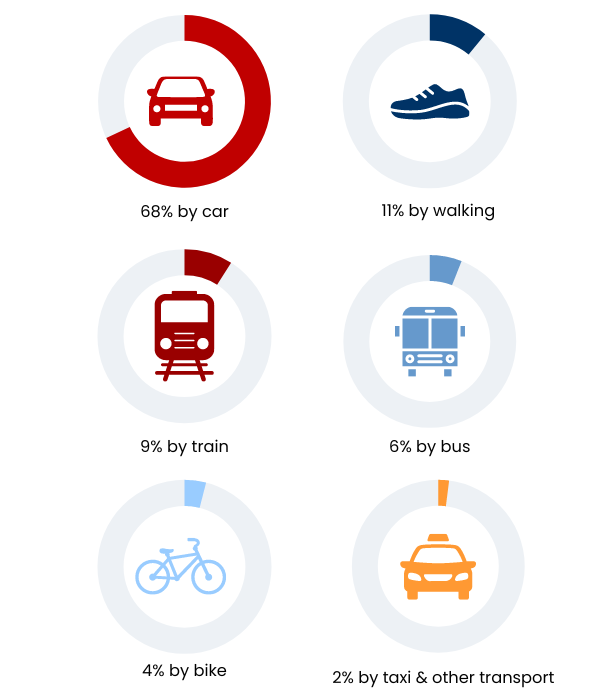
Source: www.gov.uk

Inner-city travel in the UK
Public transportation is widely accessible in all cities, featuring a mix of buses, trains, and trams and a subway system in London, Glasgow, and Newcastle. Plus, cycling is an ever-growing, healthy, and scenic way to get around!
Transport agencies manage public transit systems, ensuring regular and reliable services. Passengers can buy weekly or monthly passes to save money, plus smartcards that integrate multiple modes of transport and charge based on frequency of use.
Here are the leading transport operators in the UK's largest cities:
- London: Transport for London (TfL)
- Manchester: Transport for Greater Manchester (TfGM)
- Birmingham: Transport for West Midlands (TfWM)
- Glasgow: Strathclyde Partnership for Transport (SPT)
- Liverpool: Merseytravel
- Leeds: West Yorkshire Metro
Driving in the UK
Visitors to the UK can use their valid driver's licence from their home country for twelve months upon arrival. However, after a year, new residents must obtain a full UK driving licence.
Exceptions are drivers from the EU and EEA who can skip a UK test. Citizens from the following designated countries may trade their home driving licence for a UK licence without taking a test:
Andorra, Australia, Barbados, British Virgin Islands, Canada, Cayman Islands, Falkland Islands, Faroe Islands, Gibraltar, Hong Kong, Japan, Monaco, New Zealand, Republic of Korea, Republic of North Macedonia, Singapore, South Africa, Switzerland, Taiwan, Ukraine, United Arab Emirates and Zimbabwe.

British history timeline
Pre-1600s
Humans have inhabited the island of Britain for millennia. Indigenous people, the Celts, and invaders like the Romans have shaped its culture, language and social structure.
1600s
Britain's colonial ambitions led to exploration across North America, with explorer John Cabot laying the groundwork for future colonies like Jamestown.
1700s
Following the Seven Years' War and the Treaty of Paris in 1763, Britain consolidated its status as a global power. The Acts of Union in 1706 and 1707 united England (including Wales) and Scotland, forming the Kingdom of Great Britain.
1800s
Thanks to advanced weaponry, the British Empire peaked during the Industrial Revolution. The Act of Union with Ireland in 1800 created the United Kingdom of Great Britain and Ireland.
1900s
The Irish Free State was established in 1922, forming the United Kingdom of Great Britain and Northern Ireland. In 1931, the Statute of Westminster granted legislative independence to the UK's dominions.

British culture: values, traditions, food and more!
Depending on where you're from, life in the UK might take a little getting used to, as the Brits have peculiar customs and quirks! If you're from English-speaking countries like the US and Australia, there will be similarities but also significant differences:
- Ingrained politeness: Britons are famous for overusing phrases like "please," "thank you," and "sorry," and would rather discuss the weather than anything that might offend a stranger!
- Historical heritage: the UK draws millions of visitors yearly thanks to landmarks such as Edinburgh Castle, Stonehenge and the Tower of London. Britain's past profoundly influences everything from architecture to national holidays like Remembrance Day.
- Will my plugs fit?: the UK uses type G plugs and electrical outlets featuring three rectangular prongs in a triangle pattern. The standard voltage is 230V, and the frequency is 50Hz. Visitors can use plug adapters for non-UK devices and equipment upon arrival; however, long-term use is considered unsafe.
- Sporting pride: the Brits have a passion for sports, particularly football (soccer), rugby, cricket and tennis, which were all invented in England. Exciting events, such as the FA Cup, Wimbledon, and the Six Nations, are major talking points throughout the year and unite the nation.
- Seasonal cheer: as a country with four distinct seasons, the UK enthusiastically embraces them all. Notable celebrations include Bonfire Night on 5th November, where communities burn effigies of failed royal assassin Guy Fawkes, and colourful markets, carol singing and family get-togethers during Christmastime.
- Multiculturalism: the UK is known for its diverse society, especially in large cities like London and Birmingham, where people from various backgrounds contribute to the country's cultural landscape. Celebrating different traditions and cultures, such as London's Notting Hill Carnival, is fundamental to modern British identity.
10 surprising facts about the UK
- The UK has some strange laws! To curb illegal salmon fishing, the Salmon Act of 1986 made it illegal to "handle salmon in suspicious circumstances".
- Bizarre place names are a staple of British life. However, the UK is also home to some very long and short names. "A" is a village in Shetland, while "Llanfairpwllgwyngyllgogerychwyrndrobwllllantysiliogogogoch" is a hard-to-pronounce Welsh town!
- The world's first traffic light system was installed outside the House of Parliament in London in 1868. It was manually operated and featured railway signalling gas lamps representing "stop" and "go".
- For more than twenty years, Bristol-based graffiti artist Banksy's identity has remained unknown despite numerous attempts by the media to unmask him. His celebrated anti-establishment and often humorous artworks appear randomly across the UK and worldwide.
- The world's longest pleasure pier is in Southend-on-Sea, Essex, measuring over 1.3 miles long. If you don't fancy the walk, a train can take you to the end and back.
- From the 1200s to the 1900s, the Tower of London housed exotic animals, including lions, polar bears and elephants. The animals were gifts to the reigning monarchs and were publicly displayed during the 1800s.
- Beneath the streets of Liverpool lie the Williamson Tunnels, a network of secret 19th-century tunnels initially constructed to transport goods from the Liverpool docks. Today, they are a popular tourist attraction.
- In 1858, London experienced a severe heatwave that intensified the smells of the polluted River Thames. The resulting stench was so overpowering that it prompted the construction of the city's modern sewage system.
- Stonehenge, a circle of standing stones in Wiltshire, England, is one of the world's best-known prehistoric monuments. To this day, how and why it was constructed remains shrouded in mystery.
- Cooper's Hill Cheese-Rolling and Wake is an annual event in Gloucestershire, England. Participants race down a steep hill to chase a rolling wheel of cheese. Post-race hospital visits are not uncommon in this much-loved yet bizarre tradition!
The world's longest pleasure pier is in Southend-on-Sea, Essex, measuring over 1.3 miles long.

What is the average life expectancy in the UK?
For men
79 years old
For women
83 years old
Source: www.ons.gov.uk

Which celebrities are moving to the UK?
Recently, numerous celebrities have made the UK their permanent home or have at least bought a summer retreat. The following are a few notable celebs who can't get enough of Dear Old Blighty:
George Clooney: the ER and Batman & Robin star bought a £12M Grade II listed mansion in Sonning, Berkshire, after marrying English lawyer Amal Alamuddin in 2014. "I do love it here," Clooney declared on ITV's Good Morning Britain soon after the purchase.
Tori Amos: the American singer-songwriter relocated from Los Angeles to sleepy Cornwall in 1997. Amos has kept a quiet profile in the countryside while raising a family and continuing to write and record music.
Tim Burton: the Edward Scissorhands director moved to North London after meeting his future wife, Helena Bonham Carter, in 2001. The couple have since split, but Burton remained after falling in love with the UK. "When I first came to England, I thought, 'Wow! I'm home!'" he told the Guardian in 2016.

Traditional British food: famous dishes in the UK
From beloved classics like fish 'n' chips and Sunday roasts to Chinese takeaways and Indian curries, British food has evolved to reflect the country's multiculturalism. Here are some of the UK's best-loved meals you must try:
- Fish 'n' chips: deep-fried battered fish and thick-cut chips, often with mushy peas, salt, vinegar and tartar sauce.
- Roast dinner: a traditional Sunday meal for the entire family consisting of roasted meat (usually beef, chicken, pork or lamb), roasted potatoes, Yorkshire pudding, vegetables, and gravy.
- Sweet and sour chicken: a Chinese-inspired dish featuring crispy battered chicken pieces in a tangy sweet and sour sauce, often served with rice.
- Haggis: Scotland's national dish is a savoury pudding made with sheep's organs, onions, oatmeal, suet, and spices. It's served with neeps (mashed turnips) and tatties (mashed potatoes).
- Full English breakfast: a breakfast of eggs, sausages, bacon, black pudding, baked beans, grilled tomatoes, mushrooms and toast.
- Chicken tikka masala: a globally popular British-Indian dish of roasted marinated chicken in a creamy tomato sauce, served with naan bread or rice.
- Welsh rarebit: a savoury favourite in Wales, made with a rich cheese sauce containing melted cheddar, beer, mustard and Worcestershire sauce poured over bread.
When does summer start in UK?
Summer starts in the UK on the 20th or 21st of June during the summer solstice — the longest day and shortest night of the year.
4 famous UK landmarks:

1. Big Ben, London, England:
The Great Clock of Westminster, known as Big Ben, is an iconic UK landmark. Designed by architect Charles Barry, it was built in 1859 and has since become one of the most globally recognisable London landmarks.
The name Big Ben refers to the clock's thirteen-ton Great Bell within the tower. Take a guided tour to admire its Gothic Revival architecture, enjoy 360° views from the observation deck, and learn about the tower's fascinating past.
The clock continues to captivate visitors to the city, serving as a timeless symbol of British resilience.

2. Edinburgh Castle, Edinburgh, Scotland:
Edinburgh Castle dominates the city's skyline with its eye-catching outline and storied past. Sitting on Castle Rock, the ancient fortress has played a central role in Scotland's history for centuries, witnessing everything from battles to royal ceremonies.
The castle, dating back to the 11th century, is one of Europe's oldest continuously occupied fortified buildings. Experience the grandeur of Scotland's past via guided tours of the castle's chambers, including the Crown Jewels and the Stone of Destiny.

3. The Giant's Causeway, County Antrim, Northern Ireland:
Perched along Ireland's impressive coast, the Giant's Causeway is a natural wonder comprising thousands of interlocking basalt columns. The UNESCO World Heritage Site attracts around one million yearly visitors due to its otherworldly beauty.
Created by volcanic activity over 50 million years ago, the Giant's Causeway has long been the subject of local mythology, including tales of warring giants.
Enjoy its spellbinding geological formations, each hexagonal column a reminder of the beguiling forces of nature.
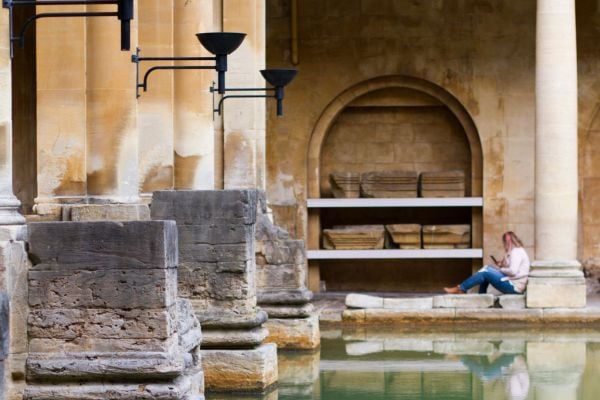
4. The Roman Baths, Bath, England:
Located within the historic city of Bath, the Roman Baths transport visitors to ancient Britain. This architectural masterpiece showcases the forward-thinking sophistication of Roman engineering.
Taking advantage of the natural hot springs rising from beneath the earth's surface, the baths were a social and religious hub for Roman citizens. Today, visitors can explore the remarkably preserved ruins of the bath complex, including the Great Bath and the Temple Courtyard.
The baths' timeless beauty and fascinating history provide an authentic glimpse into the Romans' legacy.

How to move to the UK
For over 25 years, Seven Seas Worldwide has shipped household belongings to hundreds of countries. From London to Edinburgh, we'll safely ship furniture, kitchen appliances, sporting equipment, boxes, bags and more to the UK. Our expert team, free packing supplies, customs knowledge, complimentary storage, and multilingual customer support set us apart from other international removal companies.
What is the MoveCube® moving pod?
You can ship all your home's possessions inside our secure shipping crate, the MoveCube®. It acts as your own dedicated container, brought to your door for you to fill with sofas, kitchen appliances, bikes, musical instruments, boxes, bags and more!
Each MoveCube® order includes a complimentary Starter Pack. Inside, you'll find measuring tape, a marker pen, a box cutter, a roll of parcel tape and a tape dispenser to help you pack. Plus, three plastic floor sheets to help you estimate the space inside a Large, Medium, or Small MoveCube®.
You can order as many MoveCubes® as needed, but please note that they may arrive on separate days. Start your exciting new life in the UK today with a quick, free quote and see a transparent cost breakdown of the entire overseas shipping process.
Another benefit of choosing our international removal service is that we guide your shipment through the British customs process. However, there are a few things to remember before packing your boxes and moving household items to the UK.
- Like all nations, the UK has restrictions on certain import items to protect its people and environment. Read our Prohibited Goods page before packing to avoid delays or fines.
- Complete all your online documents and ensure your inventory (a packing list of every item you're shipping to the UK) matches what's in the MoveCube(s)®.
- Upload clear, colour scans of your passport's picture and signature pages.
- If shipping wood, plant life or animal by-products and their derivatives, ensure they are not classified as endangered by CITES (Convention on International Trade in Endangered Species of Wild Fauna and Flora).
You must complete a Transfer of Residence (ToR1) form to import used personal goods into the UK duty-free. Qualifying criteria include:
- Making the UK your full-time residence.
- Having lived outside the UK for at least a year before importing.
- Owning and using your items for at least six months before importing.
- Keeping all items for personal use.
If you live and study in the UK, you do not need to complete a ToR1 form. You can import clothing, household effects (e.g., linen and bathroom items), and objects typically used by students, such as textbooks and calculators, with no duty charges.
Please reference our Importing into the UK page for a complete breakdown of the British customs process.

Transit times for shipping to the UK
The following are estimated transit times when shipping one Large MoveCube® by sea from the capital cities of some of our most popular routes to London, United Kingdom:
| Origin country | Transit time* |
| Australia | 130 days |
| China | 85 days |
| Hong Kong | 74 days |
| Ireland | 47 days |
| Malaysia | 110 days |
| Netherlands | 123 days |
| New Zealand | 142 days |
| Singapore | 110 days |
| South Africa | 90 days |
| Thailand | 100 days |
| USA | 142 days |
*estimated timings dependent on global shipping circumstances.
FAQs about moving to the United Kingdom
To apply for a UK visa, research visitor visas and working visas on the official British government website to learn about eligibility and which documents you'll need.
Approval times for UK visas depend on personal circumstances. Factors include your origin country, the type of visa you're applying for, and whether you intend to work or study.
We advise checking the official UK government website for the latest processing estimates. Ensuring the accuracy of all information and documents during your application will reduce the likelihood of delays.
Your UK visa's validity period depends on its specifics. Before applying, carefully read the rules and stipulations of your desired visa.
Visit the official UK government website website to check which visas you qualify for.
The money needed to move to the UK depends on your residency route. Based on factors like visa application fees, the healthcare surcharge, flights and temporary housing costs, the teacher recruitment agency, Quantum Scholars, estimates £3,500 - £5,000 per person.
Choosing where to live in the UK depends on several factors, including lifestyle choices, schools and job opportunities. Lively cities like London and Manchester offer many jobs, restaurants and cultural options. Alternatively, the quiet, rural landscapes of the Highlands or the Lake District might better suit your vibe.
The UK's top 10 in-demand jobs are web developers, software engineers, cybersecurity specialists, high school teachers, insurance consultants, accountants, financial analysts, customer service representatives, nurses, and midwives.
The best universities in the UK are the University of Oxford, University of Cambridge, Imperial College London (ICL) and University College London (UCL).
Living in the UK offers diverse experiences, thanks to vibrant cities packed with cultural options and exciting nightlife, as well as the quiet, rolling hills of the countryside. Brits can enjoy free healthcare at the point of service, a competitive jobs market, multiculturalism and stunning landscapes.
You can move to the UK without a job if you are studying, have a unique business idea or if you qualify for a Family visa or Global Talent visa.
You can import cats, dogs and ferrets into England, Scotland, and Wales, provided they are microchipped, vaccinated against rabies and have an up-to-date pet passport or health certificate. Different rules apply to Northern Ireland.

Extra resources to help with your move to the United Kingdom
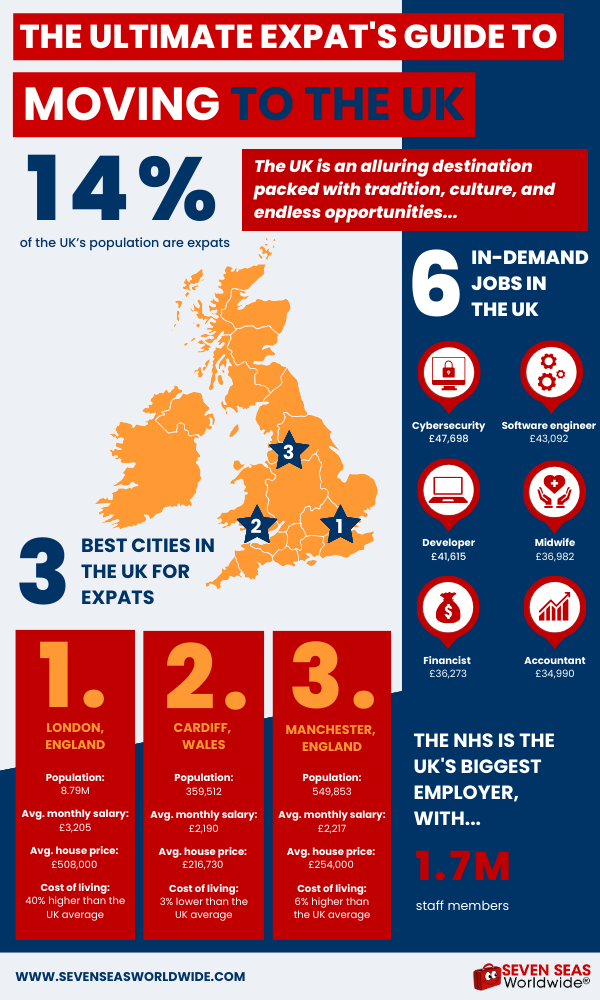
...check your finances to see if you have enough funds to support yourself and your family in the UK for a few months before securing a home and job.
Moving to Britain checklist
Simplify your exciting move to the UK with our handy checklist:
- Plan ahead by asking family, friends and expats for advice: before making an impulsive decision, weigh all the pros and cons of living in the UK.
- Research all your visa and residency options: learn about the various entry methods and how to apply for a visa. Then, choose your most likely option for acceptance.
- Run the numbers: check your finances to see if you have enough funds to support yourself and your family in the UK for a few months before securing a home and job.
- Choose an area to live in and decide to buy or rent: pick a city or town that suits your family and consider renting on arrival to give yourself time to settle in.
- Set up accounts for your bills and savings: open a British bank account and transfer money from accounts in your home country.
- Land a job: learn about British employment etiquette, including successful job-searching methods, application tips, employee benefits and in-demand roles.
- Organise schooling: enrol your children in nearby schools or register to teach them from home.
- Understand the British healthcare system: learn about the NHS's tax-funded essential services, what it doesn't include, and the benefits of taking out private insurance.
- Learn about the UK's transport options: discover the UK's efficient, modern and integrated public transport systems.
- Check if you have the right to drive: depending on your country of origin, you may not need to take a UK driving test.
- Learn about Britain's storied past and present: gain a fuller understanding of this proud nation by learning about its unique formation, traditions and multicultural influences.
- Book an overseas removal company: research the best international removals experts to ship all your household belongings to the UK.
